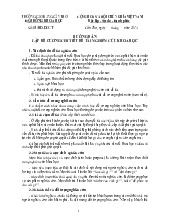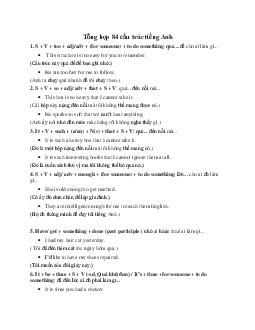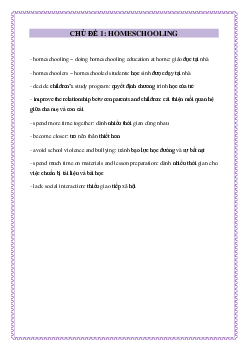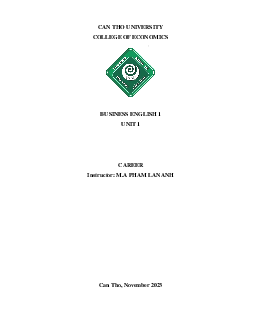





Preview text:
UNIT 3
PART 1: Social interaction (3’) Let’s talk about mobile phone
1. Do you often use your mobile phone? Why (not)?
I use my mobile phone very often, in fact every day. I’m trying to cut back massively on my
phone over usage. But I can’t get away from it because I have to check notifications from my
friends, lectures all the time. If I had to make a guess, I probably look at it close to 20 times a day.
2. Are you satisfied with your mobile phone service? Why (not)?
Yes, I’m totally satisfied with my mobile phone service - Viettel. Coverage and speeds are quite
good. It has the best 4G coverage in the country for now. The scratch-off vouchers can be
acquired in most convenience stores, just look for the Viettel logo. It has multiple data packages
at a fair price to choose such as monthly packages, daily packages and packages for 3 or 7 days.
3. Do you think you will continue to use your mobile phone service? Why (not)?
I definitely will. As prices don't differ so much between the 3 major operators, Viettel should be
my first choice, especially when I’m in rural areas. It has the best coverage in remote places
even on 4G. Furthermore, I use my current phone number to register on my shopping online
account, social media sites and health declaration. It will be a big issue to have my phone
service’s changing. I also need to announce to my friends and family that I have a new phone number.
4. What are some troubles mobile phones may cause to you?
Although mobile phones have numerous advantages and make our lives a lot easier, it also has
some harmful effects. Increased use of cell phones is said to cause vision problems. The
symptoms include stress, redness, burning sensation, blurred vision, and dry eyes. Using a
mobile phone more often significantly increases the risk of health problems. They may cause
headaches, decreased attention, shortness of temper, sleep disorders and depression.
PART 2: Solution discussion (4’)
Situation: Your volunteer group is making a trip to help children in remote areas. Three things
are suggested as a gift to help them: money, books, clothes. Which do you think is the best choice for them? •
Books: I want to bring the joy of reading to children in remote areas. I find reading
extremely useful and want to pass this passion to other young people. Reinforcing reading
habits among children of remote areas will give them the same opportunities as urban
children enjoy in terms of reading and nurturing their independent thinking abilities. Foster
reading habits everywhere, thus positively contributing to educational improvements in
Vietnam. (money có thể kiểu rồi nó sẽ hết, những kiến thức, sách thì còn mãi, kiến thức → đi làm
→ mua quần áo phù hợp) •
Money: When children are given cash, it would most likely be taken away from them. I
don’t know whether their parents would take advantage of the money or use it properly.
Instead of giving them cash, I think I should ask them what they want and wait for a specific
answer. In addition, some of them are too immature to lose the money. •
Clothes: The problem of clothing giving is this I’m not sure whether it fits the children well or not.
PART 3: Topic development (5’)
Topic: There are some elements of adulthood.
How can we classify a true adult? Many people directly attribute age to adulthood. If you ask
various people of different cultural backgrounds what age a person progresses from childhood
into adulthood, their answers will always be different. In my opinion, adulthood is not completely
based on age. Adults are characterized by maturity, responsibility, and their behavior.
Responsibility is the essential defining attribute to qualify as an adult because
responsible for oneself as at once having the capacity, the willingness and actually enacting in
the behavior of living moment to moment. Unlike children, an adult can be seen in taking care of
doing what they said, promised and signed up to do, without any if’s, but’s, blaming others,
rationalizations, reasons, or excuses for not doing what there is to do.
Adults feel the need to take responsibility for their lives and decisions and this is why it’s
important for them to have control over their behavior. Adult behaviors often follow social norms.
They must be able to discern what is the right thing to do. Adults must think carefully before
acting, and can't help but think about the consequences like when they were children.
In addition, knowing their true self is the reason why maturity should be one of the
elements of adulthood. They have insight into what is important to them in life and give
thoughtful messages, opinions. Hence it is obvious as soon as you meet them that they care deeply about what they do.
Further questions
1. What problems are children around the world facing?
Child labour: Many children are forced to work instead of attending school. Families
living in poverty often rely on children to supply extra income. Many of them never go to school
or drop out of school to work.
Disabilities: Much social and cultural discrimination remains around disability. Children
with disabilities are more likely to miss out on school than other children. An estimated one in
three out-of-school children have a disability.
Child marriage: Early marriage and pregnancy often leads to dropouts and girls being
banned from school. Children who do return may face bullying. An average of 40,000 children
and young women under the age of 18 are married every day
Gender-based violence occurs everywhere around the world across all economic and
social groups. While both boys and girls are negatively impacted, girls are particularly at risk. An
estimated 1 in 3 women globally have experienced physical or sexual violence in their lifetime,
mostly at the hands of their partners. .
2. Why is it important to protect children?
An efficient protection is essential to the children’s well-being because children are the future.
They are still developing and are especially vulnerable – more so than adults – to poor living
conditions such as poverty, inadequate health care, nutrition. The effects of disease,
malnutrition and poverty threaten the future of children and therefore the future of the societies
in which they live. Children's earliest experiences significantly influence their future
development. The course of their development determines their contribution to society over the course of their lives. UNIT 4
PART 1: Social interaction (3’) Let’s talk about friendship 1. Do you have many friends?
I’m a sociable person, I love making friends where we can share our interests and have lots of
fun with it, you know “the more the merrier”, which is why wherever I go you can see there are
friends surrounding me talking like it never gets enough.
2. Would you like to have more friends? Why (not)?
I have no reason to close my heart when it comes to making friends since we have nothing to
lose but we get benefits of it. Having more friends means you widen your relationships, enrich
your knowledge, and live a more enjoyable life.
3. Do you prefer to make friends online or offline? Why?
I think I would choose offline, it would be better if we can hangout face-to-face, you will
distinguish precisely what happen in their life events; online is kinda hard-to-get, friends are
supposed to be together through the shifts and changes of life (những thăng trầm và thay đổi
trong cs). We can strengthen our relationship by treasuring the time we spent together, online is
just out of reach, sometimes you do want to do something but they live far away.
(new) Offline can be the right choice here since we can easily know more who they really are
when we are in the same community before sharing anything. However, you can be taken
advantage of through making friends online. Are you really sure that they are who they seem to
be? It is dangerous to provide your online friends with too much personal information.
Hanging out together means you can get to know their emotions in front of you, their meaning
underlie their messages. In contrast, making friends online is more into communication without
body language and intonation which can lead to misunderstandings, and sadly, emotional icons don't always help.
4. Do you like to spend time with friends or family? Why?
These 2 options are hard to say, when each one has its bright side. Friends are definitely
straightforward (easy) to say what we want to, it is more comfortable when they may know
exactly what we have been through when parents are too busy to consider. After all, you still
have to come back home, they are the one who are always by your side, they love who you are;
sometimes it would be challenging to make friends, you have to find someone who has the same interests as you.
PART 2: Solution discussion (4’)
Situation: Your friend’s birthday is coming soon. You want to send him/her a birthday card. There
are three choices: an e-card sent via email(1), a birthday card made manually by you(2), or an
iconic wish on Zalo(3). Which do you think is the best choice?
• It never costs that much to buy materials to make one and send it, it is all based on your
sincerity. Having a birthday is one in a year, and why don't we make it more special, this
way strengthens our relationship by treasuring our good deeds when it comes to the time and efforts we put in.
• Zalo can send notification for you on his or her birthday, then you just simply finger an
iconic congratulation, this shows that this is your duty and when you end up with
completion, you can forget it and go do what you want. It cannot show any true concern
behind it. Similar to an e-card. (somehow it is only like spam in the chat box, overtime
we let the message drift. (trôi đi) )
• Sending an ecard via email is not a common thing as my friends only use email to work
or study, not to chat. It will be a pity if they miss my e-card on their birthday. While an e-
greeting card is enjoyed for a few minutes, it inevitably gets deleted. In contrast, a
traditional greeting card can be kept and enjoyed for a lifetime.
PART 3: Topic development (5’)
Topic: There are some benefits of making things by hand
In the world where scientific and technological advances dominate, we continue to show a
tendency toward affording products whose requirements’ production last long hours or less
instead of manufacturing them on our own, leading to the point that we let manually made
products' benefits fall into oblivion. (bị lãng quên) ///factory-made products/// Creativity:
There are no limits to our imagination, and arts and crafts are a great way for us to turn
that endless imagination into something more productive, something we thought was impossible
in real life. the fact that it broadens ways to express our personality, feelings, and stories that
are underlying the manufactured products, making each piece of art unique and more valuable,
lead creativity beyond than ever. Educational values:
Another significant benefit of producing creation is giving us the opportunity to learn the
values of education, especially the young generation. We get the lesson of understanding its
underlying purpose then appreciating our own handcrafted products through efforts and
sentiments in the process, and also appreciating others handmade goods that are either selling
or giving to you. In addition, we learn to share our love more to everyone under artifacts to make
an environment filled with love and compassion. Connectivity:
Creating pieces means there will always have a long-lasting connection with the
individual stories, emotions behind it, between you and the maker. Whenever you look at it, you
feel like you can actually talk person-to-person with the maker at that time and you can easily
express your thoughts, emotions with it. The whole handicraft products themselves lift them up to a more personal level.
Further questions
1. What qualities are necessary for people who make things by hand? Concentration, skillful
The trend for handmade crafts has been heavily on the rise for the past few years. Most craft
activities require the development of creation and the application of patience.
If you are a person with a creative side or love developing new skills, you are easily in
love with how you can develop your imagination and work on handmade art and craft all by
yourself. With a few easy and newday ideas, you can try out basic things, all by yourself.
Sometimes while crafting it is important that steps are followed in the correct order.
Learning to wait for glue or paint to dry, for example, is the reason why people who make things by hand should be patient.
Different products have diverse in detail requirements based on individual customers or
the maker himself, so in order to make it done accurately and perfectly, we have to put high
concentration on the work, but with just a little bit neglect and it ruins all the efforts.
No matter how much concentration, forbearance or endless imagination you are, you
don’t have the talent for this, your work will definitely be hard to be done and it may not reach
the standard of beauty. “the job choose us, not conversely”(t nói á)
2. Do you think people will no longer make things by hand in the future? Why (not)?
That's definitely a no, there is still stuff that needs details to be done accurately and perfectly
while the machine cannot know and check it again. Details also vary person to person, we
cannot just build lots of mould for each stuff when it comes to customize (materials, size, shape,
model). (like engineering, ring maker,...)
Also, computers excel at analyzing structured data but haven’t yet proved as useful in more
imaginative pursuits such as writing literature or developing logos, when it is not able to feel and
express human emotion and the human condition.
Healthcare workers are playing an important role in the treatment of patients when needing
empathy and communication skills since machines are not having understanding and
consciousness to converse(trò chuyện), interact, and respond to their clients, the same as in
education, social work, and psychology, they also need to take an eye of individuals to give the best solutions for anything.



